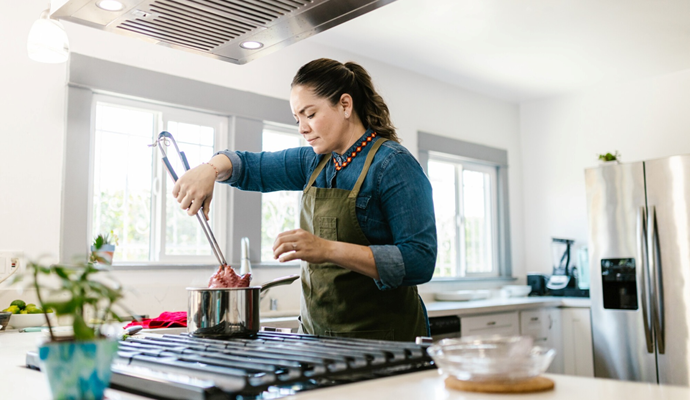Everyone has a signature dish that they tend to go for. But for some people, trying something new and preparing it for the first time tends to become nerve-wracking. Learning how to prepare a new meal is not as difficult as you think it is.
There are some basic cooking tips that you might want to keep in mind before you begin. Some of these mistakes are simple slips, but they’ll lead to a bad taste or texture that is unwanted.
Here are some common themes from cooking to avoid in the kitchen. Learn these to be the best cook you can be.
1. Overcrowding the Cooking Surface
One common mistake when cooking dinner with family is overcrowding the cooking surface, whether in a pan or on a grill. Overcrowding can cause food to steam instead of brown, resulting in a soggy, greasy, and flavorless meal.
To avoid the mistake, the cooking surface should be big enough to hold the food with a little space left over. Foods should also be placed far enough from each other so that air can circulate freely and heat can reach all sides.
2. Using Poor Quality Ingredients
Poor ingredients will not provide the desired flavor or texture. To check the quality of the ingredients, inspect them visually and have a taste, understanding that the better the quality, the better the end result.
When buying produce, choose items that are in season and from reliable sources. You should also buy locally grown products to increase the chance of getting the freshest and tastiest ingredients.
Also, it is better to use organic and natural foods whenever possible, as they are less likely to have added preservatives, salts, and other unhealthy ingredients.
To preserve the quality of ingredients, buy in small quantities and, if possible, buy fresh products only when you intend to use them.
3. Going Too Crazy with Spices and Seasonings
Going too crazy with spices and seasonings is one common dinner cooking mistake. Too many seasonings can lead to a dish that is too salty or too spicy, leaving dinner guests with a not-so-enjoyable meal. To avoid this, try to use only one to two spices per dish.
Use a sprinkle of your favorite spice or herbs for flavor rather than dumping in a large amount. You can always add more seasonings as needed. Taste your food as you cook to see which flavor combinations you prefer.
If you’re using a recipe, try to stick to the recommended amount of spice and seasonings. It’s also a good idea to stock your kitchen with basic dinner spices like:
- garlic powder
- oregano
- thyme
With reliable spices that you know you enjoy, you can easily create flavorful dinners without going overboard with the amount of seasoning.
4. Not Letting Food Rest Before Serving
Many home cooks are unaware of the importance of allowing food to rest before serving. It is recommended that food be allowed to rest for a few minutes, or up to 20 minutes, after being cooked.
This allows the juices to redistribute throughout the food, allowing it to develop the fullest flavor. Any longer than that can result in overcooking the food due to the residual heat continuing to cook it.
To avoid this mistake, time cooking accordingly and know when the ideal resting time for each dish. Keep an eye on the food to be sure it’s not cooked too long and doesn’t become overdone.
5. Not Finding the Right Cookware
Different cookware is best suited for different types of dishes. Choosing the right material and cookware shape is important for efficient cooking. Stainless steel and aluminum are both known for their durability and heat conduction.
Cast iron cookware retains heat and is perfect for searing. Anodized aluminum is also great for sautéing and browning. When frying, it is important to use a pan that is at least twice as tall as the food being cooked, as this will prevent hot oil from spilling.
Improper size or material of cookware can cause types of dinners to be overcooked or undercooked. To avoid these dinner cooking mistakes, be sure to select the correct size, shape, and material of cookware for the dish being made.
6. Undercooking and Overcooking
Undercooking can leave food dry and unappetizing, while overcooking can make it inedible or burnt. To avoid these mistakes, it is important to keep a close eye on the food.
When preparing a meal at home, say, for example, you enjoy Sultan Ahmet Turkish cuisine, it can certainly be corrected or avoided with a few simple tips. When roasting, use a thermometer to ensure that the temperature inside the oven is correct.
Use a meat thermometer to ensure it is cooked to the proper temperature as recommended. Use timers and set alarms for vegetables and other ingredients so as not to overcook them.
7. Not Paying Attention to Your Food Safety Practices
Improper food safety can lead to food-borne illness and food poisoning, as well as cross-contamination. To avoid these risks, it is important to adhere to food safety best practices such as:
- proper hand washing
- separating raw and cooked ingredients
- storing food at the right temperatures
While preparing meals, don’t forget to regularly wash your hands, cutting boards, equipment, and utensils, and check that your food is cooked properly with a food thermometer.
Additionally, consider using separate cutting boards for meat, poultry, and seafood and using color-coded or separate utensils for each ingredient.
Keeping your kitchen clean, being aware of food safety guidelines, and following through with them will help you avoid cross-contamination and food-borne illnesses when cooking dinner.
8. Not Reading Instructions Carefully
Not reading instructions often leads to a dish not being cooked correctly or at all. If you want to avoid this, the easiest way is to always read the instructions beforehand.
Pay special attention to the cooking times and methods, which are key to creating a delicious meal. If you are unsure of any part of the instructions, read them again.
Often, some clarification can be found on the same page, such as a detailed explanation of an ingredient or step-by-step instructions.
Avoid Common Dinner Cooking Mistakes
In conclusion, there are many common dinner cooking mistakes that can be avoided with a little bit of planning, knowledge, and practice.
Don’t be afraid to experiment and have fun in the kitchen – but remember, if your first attempt is a flop, use the tips in this article to troubleshoot and try again! Get cooking and become a master chef in the kitchen!
Did you find this article helpful? Check out the rest of our blog.




